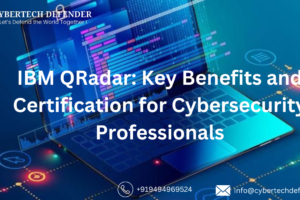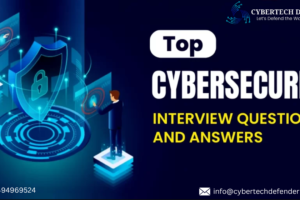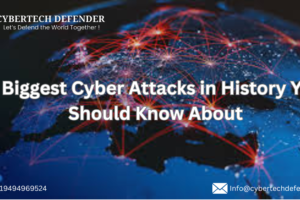
AI Hacking: Understanding and Combating the Rise of AI-Powered Cyber Attacks
Artificial Intelligence is one of the most significant technological milestones in the history of humankind. We have all been witness to its tremendous power and applications.
But this great milestone has also come with a great challenge.
While some people are using AI to create breakthroughs in fields like health and finance, some malicious players are using AI for hacking.
According to the National Cyber Security Center (NCSC), AI will increase the volume and impact of cyber attacks in the next 2 years.
But fear not, as every challenge has a solution.
In this blog, we will discuss how criminals use AI hacking and how you can protect yourself and your business from it.
What is AI Hacking?
AI hacking refers to malicious activities conducted by cybercriminals using artificial intelligence. They employ a superintelligent software system to help them gain unauthorized access to networks, siphon off information, or engage in any other form of online trouble.
The reason why AI hacking is such a big deal is that it enables hackers to automate and amplify their attackers. That makes them riskier and harder to counter.
How Cyber Criminals Use AI for Hacking?
The first step to defeating an enemy is to understand how they work. In this section, we will see how hackers use AI for hacking.

Here are some of the main techniques they employ:
1. Automated Phishing Attacks
Phishing is those misleading emails or messages that try to deceive you into revealing your private details. Well, these scams have become even more believable through AI.
A recent study by Harvard Business Review showed that 60% of participants fell victim to AI-automated phishing.
Hackers are now able to produce emails that appear exactly like they came from your bank or a trusted friend. Thus, it becomes very difficult to identify the counterfeits.
2. Advanced Malware
A malware is a digital virus that infects computers or other devices. With the help of artificial intelligence (AI), hackers can create malware that keeps changing their codes. That makes it almost impossible for antivirus programs to detect and delete them.
3. Brute-Force Attacks
Remember when you had to solve CAPTCHA puzzles so websites could know you’re not a robot? Nonetheless, these days even those can be solved by AI. It can also recognize password weaknesses and patterns that make brute force attacks faster and more likely successful by trying all possible combinations.
4. Deep Fakes
Deep Fakes are manipulated videos or audio recordings created using artificial intelligence (AI) to make someone look like they said or did something they never actually did. This tech has become increasingly sophisticated.
In fact, the World Economic Forum reports that 66% of cybersecurity professionals experienced deep fake attacks in their organizations in 2022.
Hackers can use it to spread disinformation, ruining reputations, and even swaying elections.
5. CAPTCHA Cracking
You know those little puzzles or tests you have to solve when logging into websites to verify that you’re human? Bots are now able to bypass such security measures by cracking them with AI and carrying out automated attacks.
How to Protect Against AI Hacking?
The threat of AI-powered hacking is real. But you can use several steps to protect yourself.

1. Stay Informed
This is like following the news, but instead of reading about celebrities, read about what hackers are doing. Cybersecurity changes all the time so you need to keep up with the top cybersecurity trends. It’s good to read articles and follow trustworthy cybersecurity blogs, or even take online cybersecurity courses on the latest threats and how to avoid them.
2. Use Strong and Unique Passwords
Think of your passwords as locks on your digital doors. Just like a stronger lock would make it harder for someone to get through, having more complex passwords will also help keep unwanted visitors out.
To create a strong password, use a mixture of upper case letters, lower case letters, numbers, and symbols which is difficult for anyone to guess.
Also, don’t use the same password for different sites. Otherwise if one falls into the wrong hands then they’re all at risk!
If you find it hard to remember complicated codes then try using password managers that generate them for you instead.
3. Enable Multi-Factor Authentication (MFA)
MFA is like another lock on top of your original password. Even after guessing the correct word or phrase, hackers would still need some other piece of info like code sent via text message or scanning fingerprint.
4. Be Cautious of Unsolicited Communication
If you receive an email, text, or call from someone that you don’t know, be cautious. This is especially true if they are requesting personal information or urging you to click on a link or download something. Keep in mind that hackers can be very persuasive. Therefore, never let down your guard. It is advisable to ignore anything that appears suspicious or check it with a reliable source.
5. Keep Your Software Up to Date
Software updates usually contain critical security patches designed to fix vulnerabilities that hackers could exploit. It is exactly like fixing holes in your fence regularly to keep off intruders. Ensure that your operating system, apps, and antivirus software are always updated.
6. Educate Yourself and Your Team
Knowing is power when it comes to cyber security. Take time to learn about AI-powered hacking risks and share this knowledge with your colleagues, friends, and family members. The more people know about threats the better prepared we will all become against them.
7. Employ AI-Powered Security Tools
If hackers are using AI, why shouldn’t you? There are multiple security tools that detect and block threats in real time using AI systems. It’s like having a high-tech security system for your digital life that constantly watches for any suspicious activity and sends you an alert if something seems off.
Overcome the Challenge of AI Hacking with Knowledge
AI hacking is a stark reminder that the challenges of the digital world are constantly evolving. As technology advances, so do the methods used by those who want to exploit it.
But our strongest weapon is knowledge!
We can overcome this if we understand the risks and take proactive measures to strengthen our defenses.
Remember, cyber security is not only about technology – it’s about people. Remaining updated, practicing proper digital hygiene, and investing in continuous learning is essential when fighting against threats powered by artificial intelligence.
If you’re prepared to boost your knowledge of cybersecurity and gain the skills needed to counter these changing dangers, then check out CyberTech Defender’s wide range of inclusive courses on cybersecurity.
Our comprehensive training programs cover everything from basics to advanced techniques against attacks driven by AI hackers.
Visit our website today to learn more about our cybersecurity courses.



